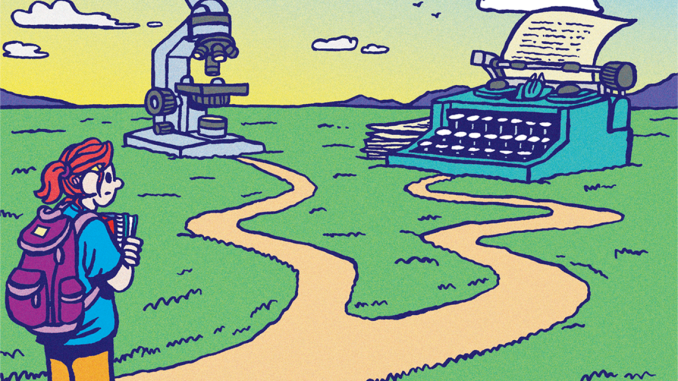
As a young girl, I learned that women aren’t always taken seriously unless they exceed expectations, so that’s what I decided I would do.
In fourth grade, I received perfect scores in my classes and joined accelerated math classes, which I continued throughout high school. In seventh grade, I joined the Philadelphia Future City Competition, a program that challenged students to design a sustainable city within a set of guidelines.
I had ambitious dreams of solving the climate crisis, but the Future City Competition was the first sign that an engineering career isn’t for me. Designing buildings and structures left me uninspired. I was more interested in the meaning and advocacy behind the work. I dreaded attending weekly meetings where we discussed taking action in an imaginary city and felt out of place because I was bored with blueprints and planning.
My passion for writing began in second grade when I wrote my first story, “The Zebra Unicorn.” I barely remember what it was about and it certainly wasn’t good, but I found joy in sharing the imaginary world I created.
I still wanted to be an engineer because I thought working in a male-dominated field would validate my intellect, but I wasn’t passionate about it after my initial exposure. Regardless, I was driven by the influence of Women in STEM, an international organization encouraging high school girls’ involvement in STEM fields, and the desire to prove my intelligence.
I told myself that my success in math and science was my only valuable academic accomplishment and maintained this mindset despite flourishing in accelerated English, history and art classes.
In 2020, I enrolled at Temple University with an undeclared major. Despite my original plan to jump into an engineering career, I decided to leave my options open while I figured out if that was the best path.
My first semester consisted of STEM courses, political science and a GenEd called Race on the Stage. The next semester, I continued with STEM courses and another GenEd, Analytical Reading and Writing, but added an advertising and journalism course because they were an opportunity to escape formulaic thinking.
Journalism courses gave me a freedom of expression that doesn’t exist in STEM. Writing follows a structure, but I can take risks instead of following rigid formulas to solve a problem.
At the start of last semester, I scheduled an advising meeting with Roseilyn Guzman, a former advisor for Temple Honors, to discuss dropping a calculus course. This would change the trajectory of my college career.
I compared STEM and journalism, stressing my concern of intellectual validation and longing to love my work.
“What do you really want to do?” she asked me.
I remembered the happiness I found in writing as a child. I began to reconnect with my creativity in writing-based courses and desired to embrace it but needed the assurance to fully commit.
“I don’t want to deal with math courses anymore, I wish I could just drop calc,” I said.
“Sounds like you’re going to drop calc,” she answered.
Roz was the first person in my academic career who validated my intelligence in a field I felt passionate about, rather than one I pressured myself to pursue.
Roz told me she saw a new brightness in my face. “How would you describe your feelings right now?”
“Relief,” I sighed, answering honestly. I was finally confident enough to pursue a career where I feel a sense of belonging.
This semester, I declared a journalism major and an environmental studies minor but reaching this point has been an exhausting process.
Although it’s important for women to assert their place in STEM, I’m not someone who belongs on that path because my passion is in writing and I no longer confuse my worth with my success in STEM. My feminism is not associated with setting myself up for a life in a career I’m not interested in. It’s about intertwining my work with feminist perspective and advocacy.


Be the first to comment